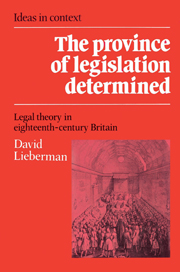Book contents
11 - The critique of Common Law
Published online by Cambridge University Press: 10 October 2009
Summary
What of all earthly pursuits is the most important? Legislation was the answer Helvetius gave. “Have I a genius for legislation?” I gave myself the answer fearfully and tremblingly – Yes!
The studied melodrama with which the elderly Bentham recalled the original discovery of his “genius for legislation” may well reflect more accurately the temperament of the aging jurist than the actual details of his youthful intellectual development. Nonetheless, it is clear that early in his twenties Bentham embarked on a project which was to occupy more than fifty years' effort, yet remain unfinished when he died in 1832. This was the creation of a “Pannomion” – a body of law complete in all its branches.
The rest of this study is addressed to Bentham's early conception of the science of legislation, and the critique of common law around which so much of that conception was formed. From this standpoint, the previous discussion of eighteenth-century legal theory can be viewed as in part designed to recover the correct historical setting for Bentham's own doctrines. Indeed, it now becomes apparent that when Bentham began his legal theorizing in the 1770s by assessing the rival claims of common and statute law, he was entering into a well-rehearsed argument. For him, as for Blackstone and his contemporaries, the relationship between common law and legislation represented a basic problem for legal theory, and a focus for more practical questions regarding the appropriate instruments for legal improvement in England.
- Type
- Chapter
- Information
- The Province of Legislation DeterminedLegal Theory in Eighteenth-Century Britain, pp. 219 - 240Publisher: Cambridge University PressPrint publication year: 1989
- 1
- Cited by

